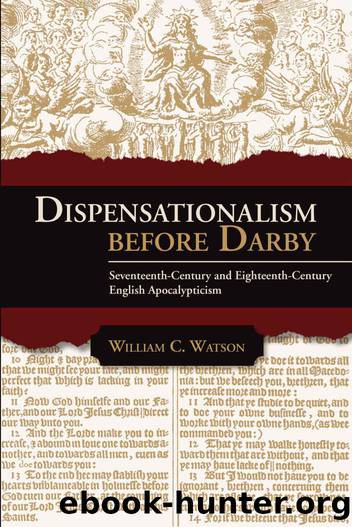Dispensationalism before Darby: Seventeenth-Century and Eighteenth-Century English Apocalypticism by William C. Watson

Author:William C. Watson [Watson, William C.]
Language: eng
Format: epub
Publisher: Lampion Press
Published: 2015-07-27T22:00:00+00:00
1Jeffrey Jue, Heaven Upon Earth: Joseph Mede (1586-1638) and the Legacy of Millenarianism (Dortrecht: Springer, 2006), 175; referring to Perry Miller, The New England Mind: The Seventeenth Century (New York: Macmillam Company, 1939). Miller reiterated this in a later rewrite, The New England Mind: From Colony to Province (Cambridge, MA: Harvard University Press, 1953), especially in chapter 6, âChildren of the Covenantâ and in his later book Errand into the Wilderness (Cambridge, MA: Harvard University Press, 1956), especially in chapter 10 âThe End of the World.â
2Paul Boyer, âApocalypticism Explained,â PBS Frontline intervierw on colonial Puritan exchatology, airdate November 22, 1988. See also James West Davidson, The Logic of Millennial Thought: Eighteenth Century New England (New Have: Yale University Press, 1977) and James Holstun, A Rational Millennium: Puritan Utopias of Seventeenth Century England and America (New York: Oxford University Press, 1987).
3Reiner Smolenski, âApocalypticism in Colonial North America,â in Seven Stein ed. The Encyclopedia of Apocalypticism: Volume 3, Apocalypticism in the Modern Period and the Contemporary Age (New York: 1998), 37, in Jeffrey Jue, 176-77.
4See chapter 15 âApocalypticism in the American Revolutionâ for these examples.
5John Cotton, The Powringovt of the Seven Vials: or an Exposition of the 16. Chapter of the Revelation (London, 1642), title page.
6Ibid., 1.
7Ibid., 16.
8John Cotton, The Churches Resurrection, or the Opening of the Fift and sixt verses of the 20th Chap of Revelation (London, 1642), 5.
9Ibid., 8-11.
10Ibid., 13.
11Ibid., 17-18.
12John Cotton, An Exposition upon the Thirteenth Chapter of the Revelation (London, 1656), 4-7.
13Ibid., 258.
14Ibid., 260-61.
15Epraim Huit, The whole Prophecie of Daniel Explained, by a Paraphrase, Analysis and briefe Comment (London, 1643), preface.
16Ibid., 1.
17Ibid., 187-89.
18Ibid., 204-207.
19Ibid., 207-208
20Ibid., 332-33.
21Ibid., 331, 343-34.
22Ibid., 347.
23Ibid., 348-56 (second time as pagination error caused a repetition).
24Thomas Parker, The Visions and Prophecies of Daniel Expounded: Wherin Mistakes of Former Intepreters ⦠. (London,1646), 1-13.
25Ibid., 27-28.
26Ibid., 31.
27Ibid., 138-41. Parker also mentioned that it was six years after Byzantine emperor Phocus made Pope Gregory âthe universal bishopâ according to a quote in Nathaniel Homes, Resurrection Revealed (London, 1653), 559.
28Ibid., 152-53.
29Ibid., preface.
30Ibid., 146.
31Ibid., 147.
32Davenportâs sermon is lost, but is mentioned in Samuel Hutchinsonâs Declaration of a Future Glorious Estate (London, 1667), 22.
33W[illiam] H[ooke], âAn Epistle to the Readerâ preface to Increase Mather, The Mystery of Israelâs Salvation (n.p.[Boston], 1669), no pagination.
34Ibid. Hooke noted âthat Learned man Mr. Mede (who was no phanatick, as the Prelates themselves will grant) ⦠This kingdom of Christ must be placed (as he saith) between Christs appearing in his kingdom, and the last Resurrection of all the world unto general Judgment.â
35Ibid., no pagination.
36Ibid., no pagination.
37Ibid.
38William Hooke, âTo the Reader,â n.p.
39Ibid.
40Increase Mather, The Mystery of Israelâs Salvation Explained and Applyed (n.p.[Boston or New Haven], 1669), Authorâs Preface.
41Ibid. Mather is incorrect in his understanding of Origen, who was anti-millennialism.
42Ibid, 3-4.
43Ibid., 4-7.
44Increase Mather, Dissertation Concerning the Future Conversion of the Jewish Nation, (1709), 1.
45Ibid., 2.
46Ibid., 7. (See Chapters 11 and 12 for discussions of Richard Baxter).
47Ibid. 8. He cites Brightman to support his position; disagrees with Baxter and Lightfoot, but respects them generally. (See Chapters 11 and 12 for discussions of Hugo Grotius.
Download
This site does not store any files on its server. We only index and link to content provided by other sites. Please contact the content providers to delete copyright contents if any and email us, we'll remove relevant links or contents immediately.
| Buddhism | Christianity |
| Ethnic & Tribal | General |
| Hinduism | Islam |
| Judaism | New Age, Mythology & Occult |
| Religion, Politics & State |
Cecilia; Or, Memoirs of an Heiress — Volume 1 by Fanny Burney(31341)
Cecilia; Or, Memoirs of an Heiress — Volume 3 by Fanny Burney(30938)
Cecilia; Or, Memoirs of an Heiress — Volume 2 by Fanny Burney(30894)
The Secret History by Donna Tartt(16642)
Sapiens: A Brief History of Humankind by Yuval Noah Harari(13067)
Leonardo da Vinci by Walter Isaacson(11912)
The Radium Girls by Kate Moore(10914)
Sapiens by Yuval Noah Harari(4545)
The Wind in My Hair by Masih Alinejad(4427)
How Democracies Die by Steven Levitsky & Daniel Ziblatt(4407)
Homo Deus: A Brief History of Tomorrow by Yuval Noah Harari(4286)
Endurance: Shackleton's Incredible Voyage by Alfred Lansing(3850)
The Silk Roads by Peter Frankopan(3767)
Man's Search for Meaning by Viktor Frankl(3644)
Millionaire: The Philanderer, Gambler, and Duelist Who Invented Modern Finance by Janet Gleeson(3573)
The Rape of Nanking by Iris Chang(3518)
Hitler in Los Angeles by Steven J. Ross(3442)
The Motorcycle Diaries by Ernesto Che Guevara(3340)
Joan of Arc by Mary Gordon(3262)
